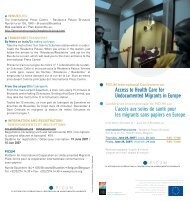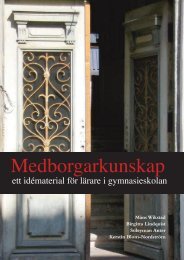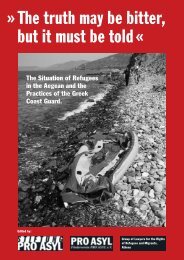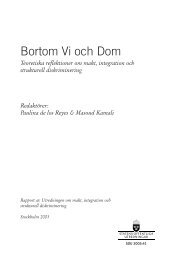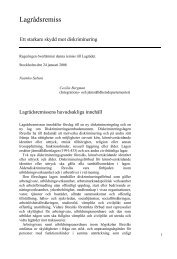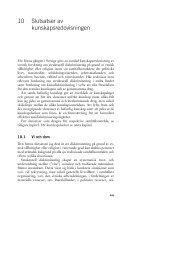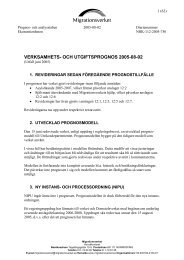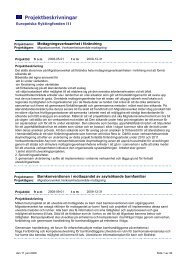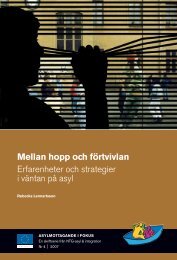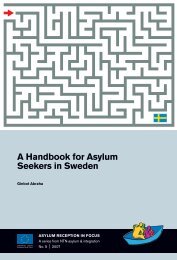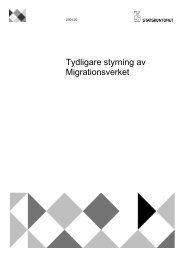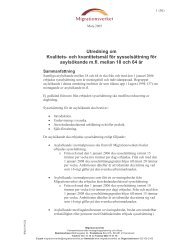getting asylum seekers into employment - Tema asyl & integration
getting asylum seekers into employment - Tema asyl & integration
getting asylum seekers into employment - Tema asyl & integration
You also want an ePaper? Increase the reach of your titles
YUMPU automatically turns print PDFs into web optimized ePapers that Google loves.
KEMMEPAP- IFESTOS – A good EQUAL practice – Daniel Esdras, IOM GreeceMr Daniel Esdras from IOM presented an example of a successful EQUAL project that wasimplemented under Round 1. The project addressed the reception needs of <strong><strong>asyl</strong>um</strong> <strong>seekers</strong>. Aninformation centre was created which provided information, counselling, support and guidance aswell as accreditation of the technical knowledge and qualifications of <strong><strong>asyl</strong>um</strong> <strong>seekers</strong>. This isnecessary because <strong><strong>asyl</strong>um</strong> <strong>seekers</strong> often have to leave in haste and do not take their diplomasand certificates with them. The project also aims to raise awareness among the local populationand employers and change mentalities. For example, many do not know the difference betweenan <strong><strong>asyl</strong>um</strong> seeker and a refugee.The project was implemented in Northern Greece and Athens, which is the municipality with themost <strong><strong>asyl</strong>um</strong> <strong>seekers</strong>. The target group was provided with information which would help them toadapt to the new society, integrate <strong>into</strong> the local community and enter the labour market. Many<strong><strong>asyl</strong>um</strong> <strong>seekers</strong> are not aware of their rights and experience difficult working conditions andexploitation in the labour market. Language training programmes and courses in technical skillswere offered, as well classes in journalism and publishing in the mass media. Training was alsoprovided in professions for which there is a particular demand on the labour market, for example,nursing.Corporate Social Responsibility and vulnerable groups – Dimitrios Papadopoulos, GreekCorporate Social Responsibility NetworkMr Dimitrios Papadopoulos introduced the Greek network for Corporate Social Responsibility andtold participants how the network has made a difference through its participation in the Ithaca DP.This network was established six years ago and is made up of 13 Greek corporations, 6 businessassociations and 80 companies as members. It is also part of a European network called CSREurope which is a network of European partners.Business inevitably affects society and the environment. CSR is about companies integratingsocial and environmental concerns in their business operations and in their interaction withstakeholders such as employers, NGOs, the local community and general public. There areexpectations on the role of companies in modern society. Businesses can contribute to theimprovement of society and local communities in a number of areas such as: decreasing povertyand homelessness, contributing to a better environment, improving health services andeducation, art and culture, and addressing criminality.The network is dedicated to providing equal opportunities for ‘socially sensitive’ groups bypromoting dialogue, sensitising employers, publishing good practices, promoting vocationaltraining and the training of employers and employees. This network is part of the Ithaca DP andhas access to the Estia network set up by the Greek Round 1 DP. It has produced videos ofsuccess stories and organised a visit to the camp in Lavrion. Representatives from 25 companiestook part in the visit, which is part of the ‘seeing is believing’ approach. They were able to witnessand see the problems faced in the camp.How to convince employers – a case study – Sotiris Stamatiou, Shell GreeceA presentation by a representative of an employer, Mr Sotiris Stamatiou from the humanresources department of Shell Greece, revealed Shell’s experience with employing <strong><strong>asyl</strong>um</strong><strong>seekers</strong>. An <strong>employment</strong> project was implemented 3-4 years ago which offered <strong>employment</strong>opportunities to <strong><strong>asyl</strong>um</strong> <strong>seekers</strong> in cooperation with the UNHCR and NGOs. The aim was toprovide help to the local community and promote a diverse working environment while enrichingstaff resources.The following criteria were agreed on for the selection of participants: a minimum knowledge ofthe Greek language, possession of a legal work permit and a driving licence. The managers andother employees had to be prepared first by telling them about the aims of the project andexplaining the difference between <strong><strong>asyl</strong>um</strong> <strong>seekers</strong> and refugees. As first there were some3 EQUAL AS event - <strong>employment</strong> V2.doc
difficulties faced, but afterwards the old and ‘new’ employees were able to work together inharmony.More than 40 candidates were interviewed and 8 were selected to work as pump and car washattendants for periods of 3 months to 3 years. The participants were all men from Iran, Iraq andAfghanistan and between 20 and 40 years of age. Many were educated: 1 in 3 had a universitydegree.The ESTIA database – A good EQUAL practice – Lora Pappas, National Youth FoundationMs Lora Pappas from the Ithaca DP introduced the ESTIA database which was initiallydeveloped by the DP under Round 1 and is being further expanded and improved under Round2. The ESTIA database has taken its name from the Greek goddess who protects the family andhome. It is an electronic network based on a common database system. It was set up inresponse to the existence of several databases maintained by different organisations. Thesehave been integrated via the database <strong>into</strong> a network of connected agencies. At the beginning,other EQUAL partners were connected to the database and then access was extended to otherNGOs.Asylum <strong>seekers</strong> go through a registration procedure which creates a profile of his/her level ofeducation, marital status, etc. All the agencies connected to the database are able to see the<strong><strong>asyl</strong>um</strong> <strong>seekers</strong>’ profiles. The database is used as a ‘one-stop-shop’ which links differentagencies with different structures and operates on a common basis. Referrals are madeelectronically from one agency to another which limits the overlap of services. It is also a tool forcollaboration and cooperation between agencies. The Ministry of Health was helpful in offeringaccess to other bodies.In Round 2 an attempt is being made to widen the network and give limited access to ESTIA toemployers in order to promote the matching of persons with jobs. New partners who have joinedthe DP under Round 2 include the Greek CSR network, the UNHCR and the Chamber ofCommerce and Industry.Helping young <strong><strong>asyl</strong>um</strong> <strong>seekers</strong> to access the labour market – The role of employers –Afroditi Gorantonaki, Heraklion Chamber of Commerce and IndustryMs Afroditi Gorantonaki of the Heraklion Chamber of Commerce and Industry told participantsabout the enthusiastic response the Ithaca project received by employers interested in offeringjobs to <strong><strong>asyl</strong>um</strong> <strong>seekers</strong>.Ms Gorantonaki explained that 90% of <strong><strong>asyl</strong>um</strong> <strong>seekers</strong> in Greece live in Athens which putspressure on the socio-economic situation. One of the objectives of the Ithaca project is toencourage <strong><strong>asyl</strong>um</strong> <strong>seekers</strong> to integrate <strong>into</strong> local communities and find work outside of Athens. Italso aims to raise awareness among the business community about the problems faced by<strong><strong>asyl</strong>um</strong> <strong>seekers</strong>.Vacant jobs are registered in the ESTIA database. The Chamber acts as an intermediary,supporting the target group as well as employers. The qualifications of <strong><strong>asyl</strong>um</strong> <strong>seekers</strong> arematched with <strong>employment</strong> opportunities. It works closely with the reception centre of Anogia,keeping in close contact with the staff and <strong><strong>asyl</strong>um</strong> <strong>seekers</strong> living there, registering theirqualifications and work experience, providing them with information on stay and work permits,etc., helping them prepare to leave the centre and start a new life in Heraklion by helping themfind accommodation, and following up on their <strong>integration</strong> <strong>into</strong> the labour market.Through the members of the chamber of commerce, the project helps to raise awareness bypublishing articles in their magazine, contacting potential employers interested in employing<strong><strong>asyl</strong>um</strong> <strong>seekers</strong>, and publishing employers’ experiences of employing <strong><strong>asyl</strong>um</strong> <strong>seekers</strong> innewspapers and other publications.4 EQUAL AS event - <strong>employment</strong> V2.doc
Debate:Question for IOM:How can the good practice be transferred and address the information deficit? Can thedatabases be matched?The practice cited ran during Round 1 and has not continued. It was a large partnership made upof the Red Cross, national educational agencies and others. Its’ experiences and good practicescan inform others so that they can implement similar activities. The effects have been not only onthe target group but also on society as a whole.Question for Lora Pappas:Were there problems processing personal information? How did you deal with data protectionissues?Permission was sought and received from the Hellenic data agency. Medical and legalinformation is restricted and some fields are locked and can only be accessed with specialaccess. All the participating NGOs agreed for their information to be used. Each <strong><strong>asyl</strong>um</strong> <strong>seekers</strong>igns a paper in his/her own language stating the purpose of the database and authorising use ofthe data collected from them. There haven’t been any problems as all have signed.Question to CSR network:How do you persuade employers? What argument do you use? Are these issues discussedwithin CSR Europe?Meetings of CSR Europe are held three times a year. Issues concerning companies arediscussed, such as socially sensitive groups, but not specifically <strong><strong>asyl</strong>um</strong> <strong>seekers</strong>. Some countriesare more advanced when it comes to these issues than others. As for the arguments used topersuade employers, this depends on the company. Some are more open than others. Forexample, one member is a company producing mattresses in Northern Greece. 1 in 3 employeesbelong to socially sensitive groups. Most are refugees or immigrants and the manager isPakistani. We organised a visit to a camp and got a very good response: one third sent people.We take each case individually through direct contact with employers.EQUAL and <strong><strong>asyl</strong>um</strong> seeker <strong>integration</strong> - An overview of Round 1 and 2, Petra van Nierop,GHK.Petra van Nierop from GHK, the company providing thematic expertise to the EQUAL AsylumSeeker theme on behalf of the European Commission, presented a quick overview of EQUALRounds 1 and 2. She showed total number of EQUAL partnerships financed had risen from 38under Round 1 to 64 under Round 2. Part of this increase was due to the participation of the NewMember States in Round 2. When looking at the thematic focus of DPs, it became evident thatpartnerships were multi-thematic, addressing all aspects of <strong><strong>asyl</strong>um</strong> seeker <strong>integration</strong>. It wasinteresting to notice that the proportion of EQUAL projects addressing access to <strong>employment</strong> hadnot changed between Round 1 and 2 (63%).With the <strong>employment</strong> theme, more than half of the EQUAL partnerships from Round 2 hadplaced a high focus on providing advice, orientation and counselling on <strong>employment</strong>-relatedthemes to <strong><strong>asyl</strong>um</strong> <strong>seekers</strong>. More than one third included mediation and employer relations intheir package of activities. A much lower share (around 10%) concentrated their efforts on <strong>getting</strong><strong><strong>asyl</strong>um</strong> <strong>seekers</strong> in <strong>employment</strong> or self-employed activity. Petra van Nierop subsequentlyintroduced the workshop themes and provided some first considerations as to the type ofpractices that would be discussed as part of the workshop sessions.5 EQUAL AS event - <strong>employment</strong> V2.doc
Purpose of the meeting – introduction to the workshops, Vassilili Staikou, Greek EQUALManaging AuthorityVassilili Staikou from the Greek EQUAL Managing Authority stressed that the main purpose ofthe event was to offer EQUAL partnerships from both Rounds of EQUAL to meet each other, toexchange their experiences and promising practices and to jointly identify and explorepossibilities for transferring these to other contexts. It was also hoped that the workshop sessionswould come up with good recommendations for the upcoming Swedish Policy event, ESFprogramming and <strong><strong>asyl</strong>um</strong> and migration policy and programmes.3. WORKSHOP FINDINGS AND OUTCOMESThe group split <strong>into</strong> five workshops on the following themes:I. Employer relationsII. Preparing <strong><strong>asyl</strong>um</strong> <strong>seekers</strong> for the labour marketIV. Creating new <strong>employment</strong> profilesV. Creating work experiences where formal access to the labour market is restrictedVI. Other activities to get <strong><strong>asyl</strong>um</strong> <strong>seekers</strong> <strong>into</strong> workEach workshop was structured as follows:Introduction by the facilitators and round of introduction of the participantsThe facilitators provided a short review of the aims and objectives of the workshop and somegeneral considerations with regard to the theme for discussion. The participants were thenrequested to briefly introduce themselves.Key lessons from Round 1One or two DPs from Round 1 per workshop made a short presentation of the key lessons oftheir good practice, focusing on the context in which they developed their activity, the method andapproach used, the main success factors and obstacles and the recommendations for Round 2EQUAL partnerships.Round of questioningBefore the event, all participants had prepared an example of a promising practice within theirDP. These were circulated to al other persons participating in the workshop with the request toprepare questions on those projects that they were most interested in. Round 2 participants weretherefore not requested to present their practice, but they were invited to “question” the practicesof others, thus ensuring a lively discussion.Mapping the activitiesFollowing the round of questioning, the facilitators invited the participants to discuss similaritiesand possible typologies of practices in terms of a) context, b) method / approaches taken, c) thetarget group addressed and d) key success factors. Each participant was asked to write down aone-phrase message summarising the key characteristics of ther practice with regard to each ofthe issues listed above.The mapping helped to explore the potential and conditions for transfer.6 EQUAL AS event - <strong>employment</strong> V2.doc
Discussing the workshop key questionsOn the basis of the mapping exercise the facilitators encouraged the workshop participants toformulate initial responses to the key questions of the workshop, namely: What works? How doesit work? For whom? Why is it beneficial? Where does it work and Where else could it work?Conclusions and recommendationsAt the end of the workshop, the rapporteur prepared the overall conclusions andrecommendations of the session, together with the participants and the facilitator. These werethen presented to the Plenary, focusing on:• Opportunities to influence the current programming of the Structural Funds and theEuropean Social Fund in particular. The Member States are at present preparing theirNational Strategic Reference Frameworks and some EQUAL partnerships haveaddressed the relevant authorities directly to argue for the insertion of <strong><strong>asyl</strong>um</strong> <strong>seekers</strong> asa particular target group. This approach could also be adopted by projects in othercountries.• Ways to inform other policies in the area of <strong><strong>asyl</strong>um</strong> and migration, such as the ReceptionDirective, and opportunities to access other funding, such as the European RefugeeFund and the other financial instruments included in the Solidarity and Management ofMigration Flows programme which is currently being negotiated.• Other relevant policy areas, such as the social inclusion process, anti-discrimination andrelations with civil society.3.1. WORKSHOP I – EMPLOYER RELATIONS3.1.1. Introduction to the Workshop themeA key element for increasing <strong><strong>asyl</strong>um</strong> <strong>seekers</strong>’ <strong>employment</strong> prospects is the development of goodrelations with potential public and private employers. Very often employers are hesitant to offerjobs to <strong><strong>asyl</strong>um</strong> <strong>seekers</strong> as they are afraid of a too heavy administrative burden while dealing withthis group. Even more frequently employers are not even aware of the benefits <strong><strong>asyl</strong>um</strong> <strong>seekers</strong>can bring to their organisation.3.1.2. Workshop participantsTHEME I – Employer relationsFacilitators:Rapporteurs:Katarina Granath and Rania OikonomouLouiza PapaloizouCOUNTRY AND DP ROUND TITLE Last name First nameROUND 1ES 1 ENEAS EQUAL 1 Herrera Inaraja FernandoFI 1 Becoming Visible Sinkkonen PaiviROUND 2Equality and Solidarity forCY-5 2Asylum Seekers, Social Rightsfor All Papaloizou LouizaCZ-68 2 Human Step Götz Václav7 EQUAL AS event - <strong>employment</strong> V2.doc
SAGA - Selbsthilfe,DE-XB4-76051-20-Arbeitsmarktzugang und20/205 2Gesundheit von Asylsuchenden Grehl-Schmitt NorbertGR-232375 2 Ithaca Siganou MariaIT-IT-S2-MDL-074 2 Orizzonti Benatti DiegoES-ES20040664 2 ENEAS EQUAL 2RodriguezJimenezoSilviaOTHERDE NSS SCHMIDT BARBARAPT MA NUNES MARIAGR EQUAL MA Oikonomou RaniaGR EQUAL MA Andreou MariaGR EQUAL MA Vasiliou NikosGR EQUAL MA Tsolka EfiGreek Social CorporateGRResponsibility Network Papadopoulos DimitriosGR Heraklion Chamber Gorantonaki AfroditiGR UNHCR Stavropoulou MariaGR Shell Hellas Stamatiou SotirisGR National Youth Foundation Tsourlaki Artemisia3.1.3. Key points discussedContext and target groupsDespite the fact that the Workshop participants came from countries with very different legislationin terms of restricted or direct access to the labour market for <strong><strong>asyl</strong>um</strong> <strong>seekers</strong>, all participantsagreed that employers need to be informed about the national laws in relation to access to workfor <strong><strong>asyl</strong>um</strong> <strong>seekers</strong>. Moreover, across the Member States there seems to be a general a lack ofawareness amongst employers of ‘who’ <strong><strong>asyl</strong>um</strong> <strong>seekers</strong> are. Such information therefore alsoneeds to be provided to them.In terms of accessing jobs, un<strong>employment</strong> rates and lack of staff in specific sectors to someextent provide the direction of which employers are approached by the Partnerships to find jobsfor <strong><strong>asyl</strong>um</strong> <strong>seekers</strong>. Other important factors that impact on what types of work are possible toaccess are language barriers and the requirement of specific types of skills. Therefore, not onlylegal restrictions to work but also regulations on access to vocational training and languageeducation are important for the work of the Partnerships.The most evident target groups are naturally <strong><strong>asyl</strong>um</strong> <strong>seekers</strong> and employers. In particular theShell representative emphasised, though, that not only employers, but also other staff memberswho work and interact with <strong><strong>asyl</strong>um</strong> <strong>seekers</strong> on a daily basis need to be informed of issues thatcan arise. Other relevant persons for the Partnerships to establish contacts with and inform about‘who <strong><strong>asyl</strong>um</strong> <strong>seekers</strong> are’ include in larger companies human resource managers andsupervisors. In small companies the participants agreed that it was most important to find anopen-minded person who would be willing to listen and take on board the <strong><strong>asyl</strong>um</strong> seeker. CSR,employer organisations and trade unions were also highlighted as important interest groups, aswell as media and the general society, as it is difficult to change attitudes of individuals if there isan overall negative view of <strong><strong>asyl</strong>um</strong> <strong>seekers</strong> in the society.Getting employers on boardAll Partnerships who participated in the Workshop had worked through establishing direct(personal) contacts with employers, which were found very important to create a trust relationshipand <strong>getting</strong> the employer to offer a job or work experience to an <strong><strong>asyl</strong>um</strong> seeker. Close contactswith companies were also important for the Partnerships for another reason, which was to findout what vocational training or specific skills were needed in companies. This helped them better8 EQUAL AS event - <strong>employment</strong> V2.doc
to new context. The adopting organisation should also be prepared that it might have to changestructure and working of the organisation in order to be able to work with the practice.Using employers as a pressure group to impact on policy makers was considered as a veryeffective tool. Closer contacts and personal meetings between policy makers and staff from thePartnerships, already from the beginning of the development and implementation of a practice,were also seen as strategically very important. If possible, policy makers should even be involvedin the Partnership to help create an ownership of the practice developed.Recommendations:For the Swedish Policy Forum• Invite companies with positive experiences of hiring <strong><strong>asyl</strong>um</strong> <strong>seekers</strong>.• Minimum standards for <strong><strong>asyl</strong>um</strong> <strong>seekers</strong> to access the labour market should be changedfrom one year to three months.For influencing ESF programming• Use existing networks with employers that have been established by EQUALpartnerships.• Use existing transnational networks created under EQUAL.• Create a catalogue on good <strong>employment</strong> practices.For other policy areas• Link to the area of entrepreneurship.3.2. WORKSHOP II – PREPARING ASYLUM SEEKERS FOR THE LABOUR MARKET3.2.1. Introduction to the Workshop themeWhen living in a new country, with often a very different culture and habits, <strong><strong>asyl</strong>um</strong> <strong>seekers</strong> maybe very eager to work, but find the new labour market too complicated or difficult to access.EQUAL partnerships are organising vocational training to adjust skills and competencies of the<strong><strong>asyl</strong>um</strong> <strong>seekers</strong> to match the local requirements or set out to train them in a completely newprofession. These activities are aimed at facilitating the beneficiary’s entry <strong>into</strong> the labour marketof the host country and/or to increase the prospects of <strong>employment</strong> after repatriation. Projectsalso provide counselling and advice to help <strong><strong>asyl</strong>um</strong> <strong>seekers</strong> on how to prepare a CV, where tofind job openings and how to prepare for a job interview.3.2.2. Workshop participantsFacilitators:Rapporteurs:Petra van Nierop, Katarina Nilsson and Joanna BusalacchiMelanie PohnerCOUNTRY AND DP /Organisation ROUND TITLE Last name First nameROUND 1NL 1Restoring Trust in the Future(HIT) - NL Bastiaens FransGR 1 Anadrasis-Istos Pappas Lora10 EQUAL AS event - <strong>employment</strong> V2.doc
<strong>seekers</strong> and helping them to better understand the labour market. What did matter, however, wasthe regional or national economic situation. In Member States with buoyant labour markets it wasmuch easier to “make the case” for implementing initiatives that would help <strong><strong>asyl</strong>um</strong> <strong>seekers</strong> tofind <strong>employment</strong>.EQUAL partnerships understood the importance of changing the perception of employers and thewider community. Often they were faced with little public awareness of the plight of <strong><strong>asyl</strong>um</strong><strong>seekers</strong>. Especially the New Member States had little tradition with immigration. Raisingawareness of the potential of <strong><strong>asyl</strong>um</strong> <strong>seekers</strong> and the benefits that they could bring to societyincreased their chances to labour market insertion (where this was allowed). Activities used tointroduce <strong><strong>asyl</strong>um</strong> <strong>seekers</strong> to the wider community included the development of meeting places,inserting <strong><strong>asyl</strong>um</strong> <strong>seekers</strong> in “mainstream” education and training, and promoting Corporate SocialResponsibility (CSR) and diversity management with bigger companies.The target groups addressed by the EQUAL partnerships were mostly mixed. In a few cases DPsfocused on particular groups of <strong><strong>asyl</strong>um</strong> <strong>seekers</strong>, such was women, young people, low-skilled<strong><strong>asyl</strong>um</strong> <strong>seekers</strong> and in one case victims of trafficking. The participants discussed whether it wasbest to focus on specific groups or whether initiatives should address all <strong><strong>asyl</strong>um</strong> <strong>seekers</strong>. Therewas overall agreement that when working with groups, it was best to ensure that these wereheterogeneous in terms of educational and skills levels, so that people would less easily lagbehind or feel that the pace of the courses and other activities was too slow. In terms ofnationality and gender, groups could instead be very heterogeneous.Another important target group of the approaches that the participants were setting up concernedthose that may contribute to the creation of <strong>employment</strong> opportunities after the <strong><strong>asyl</strong>um</strong> <strong>seekers</strong>had been prepared for labour market access. These included employers, <strong>employment</strong> agencies,chambers of commerce and other relevant stakeholders. The group stressed that it wasimportant to develop good links with the latter from the very start.3.2.4. Conclusions and recommendationsConclusionsSuccessful approaches to empowerment and motivating <strong><strong>asyl</strong>um</strong> <strong>seekers</strong> included theassessment of formal and informal skills (including recognition), and building approaches aroundthe client’s skills and competences, as opposed to providing standard services and training. Whatalso proved to increase the independence and self-esteem of <strong><strong>asyl</strong>um</strong> <strong>seekers</strong>, was includingthem in “mainstream” courses, so that they could meet people living in the new society. Finally,language was considered one of the most important tools to empower <strong><strong>asyl</strong>um</strong> <strong>seekers</strong>.The main benefits of the activities to empower <strong><strong>asyl</strong>um</strong> <strong>seekers</strong> were that they took away thefeeling that they were reduced to “just a person waiting for a decision on their <strong><strong>asyl</strong>um</strong>application”. By providing training, counselling, or any other type of activity, <strong><strong>asyl</strong>um</strong> <strong>seekers</strong> feltlike they were becoming “human beings” again with other interests. Empowerment alsoencouraged people to become active members of the new society, and even leaders of theircommunity. Another important benefit of empowering <strong><strong>asyl</strong>um</strong> <strong>seekers</strong> was that it encouragedthem to approach employers.Promising practices in relation to the development and provision of training included theindividualised approaches based on a “mapping“ of <strong><strong>asyl</strong>um</strong> <strong>seekers</strong> skills, competences andeducational needs. It had proved to be very useful to involve <strong><strong>asyl</strong>um</strong> <strong>seekers</strong> in the developmentof training to enable more effective teaching, and to combine vocational training with languageacquisition and social support. It also proved extremely useful undertake a demand / needsanalysis of the local or wider labour market as a tool to select vocational areas for training.The workshop agreed that the main success factors of the development and provision of trainingpackages and programmes were the modular and individualised approaches, focusing on boththe needs and potential of the <strong><strong>asyl</strong>um</strong> <strong>seekers</strong> and the demand of the labour market. Theinsertion of personal development and cultural expression in training helped to increase the selfconfidenceand motivation of <strong><strong>asyl</strong>um</strong> <strong>seekers</strong>.12 EQUAL AS event - <strong>employment</strong> V2.doc
With regard to network and stakeholder involvement, activities that worked well in contexts withlittle awareness and a higher degree of reluctance included the creation of informal networkingand meeting opportunities. Other successful approaches included the linking of agencies andother relevant actors in one-stop-shops bringing together all relevant partners to ensure a fullpackage of services from social support to <strong>employment</strong> mediation. The cost-effectiveness of suchservices was an important argument for their set up. As mentioned earlier, bigger enterprisesproved to be more open to CSR and diversity management considerations. Any networking hadto take <strong>into</strong> account the importance of raising political interest with a view on mainstreaming.Key success factors for involving stakeholders included the use of “passionate” and committedprofessionals to convince actors to take part in meetings and other forms of networking. It wasconsidered useful to have a clear strategy to promote the <strong>employment</strong> of <strong><strong>asyl</strong>um</strong> <strong>seekers</strong>,especially when addressing CSR and diversity management with public and private employers.Participants felt it was important that <strong><strong>asyl</strong>um</strong> <strong>seekers</strong> were integrated <strong>into</strong> “normal” publicservices (social care, <strong>employment</strong>) as soon as possible, even if they did have access to thelabour market.The main conditions for mainstreaming and transferring successful practices identified included:the use of media relations and direct contact with policy makers, close links to education andtraining institutes and setting up a “marketing strategy” for promoting the good practice from thevery start. In order to increase mainstreaming, it was also considered essential to involve “higherlevel”partners (such as regional authorities, chambers or commerce) in an operational way in theEQUAL partnership, and not just as strategic partners who would only come to meetings.RecommendationsFor the Swedish Policy Forum• The implementation of Article 11 of the Reception Directive should be monitored anddiscussed at the event. Which Member States have gone beyond the minimumrequirements and which are still inhibiting access to the labour market for <strong><strong>asyl</strong>um</strong>s<strong>seekers</strong>?• The event should show the good practices of the EQUAL initiative from both Rounds 1and 2.For influencing ESF programming• Pressure should be put on the responsible authorities to insert <strong><strong>asyl</strong>um</strong> <strong>seekers</strong> as aspecific target group• The ESF advisory committee to clarify and recommend their inclusion <strong>into</strong> nationalprogramming• Successful EQUAL partnerships should be offered some form of “continuation” undermainstream ESF actionsForm informing <strong><strong>asyl</strong>um</strong> and migration policy areas and funding• The potential between EQUAL, mainstream ESF and new funding of DG Justice,Freedom and Security (Refugee Fund, Integration Fund and Return Fund) should beexplored• Higher focus should be placed on “double” target groups (e.g. minor <strong><strong>asyl</strong>um</strong> <strong>seekers</strong> –victims of trafficking – women)13 EQUAL AS event - <strong>employment</strong> V2.doc
3.3. WORKSHOP IV – CREATING NEW EMPLOYMENT PROFILES3.3.1. Introduction to the Workshop themeThe theme of this workshop was ‘Creating new <strong>employment</strong> profiles’. The focus was on theparticular skills and competencies that <strong><strong>asyl</strong>um</strong> <strong>seekers</strong> have and how these can best be put touse. Participants in the workshop included EQUAL partnerships that have successfully creatednew vocational profiles for <strong><strong>asyl</strong>um</strong> <strong>seekers</strong> in countries, cities and regions with very competitivelabour markets or where there are policies restricting access to <strong>employment</strong> for <strong><strong>asyl</strong>um</strong> <strong>seekers</strong>.The approach taken by many DPs was to deconstruct the argument that AS are undesiredcompetitors in the labour market or that they have little to offer. Several DPs have developedinnovative activities which have given <strong><strong>asyl</strong>um</strong> <strong>seekers</strong> the opportunity to work in theircommunities as language and/or cultural mediators in the health and social services, or inprofessions where there is a high demand for workers, for example, nursing.3.3.2. Workshop participantsFacilitators:Rapporteurs:Isabel Putinja (GHK) and Christian Råbergh (SwedishNTN Coordinator)Birgit Behrensen and Katarina LöthbergCOUNTRY AND DP ROUND TITLE Last name First nameROUND 1DE-SPUK 1 (Continuation Round 2: SAGA) Behrensen BirgitSE-RE-KOMP 1 RE-KOMP Lothberg KatarinaROUND 2AT-6-18/342 2 Inpower Mayrhofer MaxFI-93 2 Becoming More Visible Heikkinen PauliDE-XB4-76051-20-20/298 2 TransKom gesund & sozial Rashid SedikaDE-XB4-76051-20-20/359 2SüddeutscheEntwicklungspartnerschaftAsylbewerber und Flüchtlinge -SEPA in EQUAL II Erben ReinerHU-25 2 Önallóan Ronto RobertRoma Cultural MediationIE-43 2Project Calvo-Martin Maria TeresaOTHERHU Managing Authority Minnei Gabriella3.3.3. Key points discussedWorkshop participants discussed and exchanged the approaches taken within their respectiveprojects which have aimed at facilitating the <strong>integration</strong> of <strong><strong>asyl</strong>um</strong> <strong>seekers</strong> <strong>into</strong> the labour marketthrough a variety of innovative methods. Such methods have included: creating new job profiles(such as working as language and/or cultural mediators in the health and social services, peertutors in the IT field), developing training programmes which allow <strong><strong>asyl</strong>um</strong> <strong>seekers</strong> to gain newqualifications and access new professional fields, and opening up access for <strong><strong>asyl</strong>um</strong> <strong>seekers</strong> toprofessions with a high demand for workers (for example, in the nursing field, craft sector andcatering industry).The common approach taken by all DPs was to give <strong><strong>asyl</strong>um</strong> <strong>seekers</strong>, by means of their ownresources, the chance to contribute to society and be active and visible members. Such an14 EQUAL AS event - <strong>employment</strong> V2.doc
approach has been necessary because of the policy context many DPs have to work in. In mostof the Member States, there are obstacles to <strong><strong>asyl</strong>um</strong> <strong>seekers</strong> accessing jobs. In many cases,they are excluded for a certain time period or face severe restrictions in the form of requirementsfor a work authorisation or permit. When <strong>employment</strong> is permitted, it is often difficult to convinceemployers to employ <strong><strong>asyl</strong>um</strong> <strong>seekers</strong> because of prejudices or misconceptions they may have.Unfortunately <strong><strong>asyl</strong>um</strong> <strong>seekers</strong> are often forced <strong>into</strong> the informal labour market as a result, wherethey are at risk of exploitation. By creating new job profiles and training programmes specificallyfor <strong><strong>asyl</strong>um</strong> <strong>seekers</strong>, DPs have been able to create new ‘niches’ for <strong><strong>asyl</strong>um</strong> <strong>seekers</strong> in the labourmarket where they can make a contribution to the host society while developing their own skillsand competencies. Participants agreed that innovative such activities have empowered andbenefited not only <strong><strong>asyl</strong>um</strong> <strong>seekers</strong> but also the service providers and employers they worked incollaboration with and the users who were able to benefit from the services they provided.3.3.4. Conclusions and recommendationsConclusionsActivities which were implemented by DPs under Round 1 have proved to be sustainable: amajority of beneficiaries supported by projects were able to enter the labour market in some form.Networks which were set up to provide opportunities for exchange and support have continued.Dialogue has been initiated between actors and important contacts with employers have beencreated and sustained. Many projects have been able to benefit from support on the highest leveland by influential organisations. Several best practice models developed under Round 1 havebeen recognised. There are also a number of promising practices emerging under Round 2.The approach taken by these DPs has resulted in a ‘win-win situation’: <strong><strong>asyl</strong>um</strong> <strong>seekers</strong> benefitfrom the activities promoting their participation in the labour market. Society also benefits fromthe skills and competencies <strong><strong>asyl</strong>um</strong> <strong>seekers</strong> have to offer. The costs of social and health serviceshave decreased as a result. At the same time, interaction with the local community has resultedin trust-building and the combating of discrimination and prejudices.RecommendationsWorkshop participants formulated several recommendations which can be taken on board atseveral levels:At a general level, it is crucial to open access to the labour market, education and training for<strong><strong>asyl</strong>um</strong> <strong>seekers</strong> so that they may be able to use and develop their skills and abilities whilemaking a contribution to the host society. A tried-and-tested approach has been to provideinnovative opportunities for <strong><strong>asyl</strong>um</strong> <strong>seekers</strong> to use their skills and competencies in specific labourmarket niches where they could make a contribution. DPs have provided such opportunities bycreating new job profiles (such as language and/or cultural mediators in the health and socialservices, or peer tutors in the IT field), developing training programmes which have allowed<strong><strong>asyl</strong>um</strong> <strong>seekers</strong> to access new professional fields, and opening up access to professions with ahigh demand for workers such as nursing.The good practices developed by DPs through the training of <strong><strong>asyl</strong>um</strong> <strong>seekers</strong> as health andcultural mediators benefit not only the participants but also the target group they provide theirservices to, while improving the quality of health and social services provided in the respectivecommunities. These practices, along with the other experiences and competencies developed byDPs and through the TCAs should be duly taken <strong>into</strong> account.Recommendations formulated for the upcoming Swedish Policy Forum:Representation from the business world at the forum is crucial. Representatives from CSREurope and companies from Sweden and other Member States could be invited as well asemployers from the public sector so that they could share their good practices and experienceswith employing <strong><strong>asyl</strong>um</strong> <strong>seekers</strong>.Good practices can be presented which illustrate how to find or create labour market niches andnew <strong>employment</strong> profiles for <strong><strong>asyl</strong>um</strong> <strong>seekers</strong>. There are several DPs under Round 1 and 2 thathave been successful in this area. References can also be made to studies on the developmentof new <strong>employment</strong> profiles, and the costs and benefits of employing <strong><strong>asyl</strong>um</strong> <strong>seekers</strong>.15 EQUAL AS event - <strong>employment</strong> V2.doc
Recommending for future ESF programming:Asylum <strong>seekers</strong> should be included as a target group in the new ESF programme with specialreference to the dimension of social inclusion, anti-discrimination and the European social model.Results from Round 1 and 2 of the EQUAL programme can provide several examples ofsuccessful practices which highlight the pressing need to promote the socio-economic <strong>integration</strong>of this target group. The transnational aspect and good practices which have come out of theTCAs in the <strong><strong>asyl</strong>um</strong> theme should be taken <strong>into</strong> account in the new programme. Reference to theLisbon strategy and the European Employment Strategy should be made.Recommendations for other policy areas:Ways to communicate, cooperate and share experiences with projects and programmemanagers/managing authorities from ERF (and other relevant programmes such as the newfunds under the Solidarity and Management of Migration Flows Programme, and the Europeannetworks on migration and <strong>integration</strong> should be established on the national and EU levels,especially concerning the improvement/implementation of the Reception Directive.New ways should be found to incorporate the knowledge and findings from research and studieson <strong>employment</strong> policy, and developments and changes in vocational and professional fields incooperation with job observatories.3.4. WORKSHOP V – CREATING WORK EXPERIENCES WHERE FORMAL ACCESS TO THELABOUR MARKET IS RESTRICTED3.4.1. Introduction to the Workshop themeThis workshop had its focus on the innovative and alternative ways DPs have developed towardsproviding <strong><strong>asyl</strong>um</strong> <strong>seekers</strong> with work experiences in Member States where access to <strong>employment</strong>is limited or not allowed. Several of the participating partnerships have shown how they havebeen able to convince employers to offer volunteering, on-the-job training or work shadowingopportunities to <strong><strong>asyl</strong>um</strong> <strong>seekers</strong>. Key to these alternative work experiences is the combinationwith other activities such as for example language and communication skills.A crucial element in the approaches adopted is that <strong><strong>asyl</strong>um</strong> <strong>seekers</strong> gain work experiences forraising self-esteem, language acquisition, improved motivation and confidence, improved mentaland physical health as well as, if granted status, they have more access to the labour market.Alternatively, recognising that the majority of <strong><strong>asyl</strong>um</strong> <strong>seekers</strong> will not be granted status, theydevelop their skills and provide evidence of their vocational engagement while in Europe whichwill assist their re-<strong>integration</strong> and development wherever they go.3.4.2. Workshop participantsFacilitators:Rapporteurs:Eliza Kritikos (GHKI) and David Hudson (ECRE)Karen-Inger Thorsen and Maggie LennonCOUNTRY AND DP ROUND TITLE Last name First nameROUND 1Want2work 1 Want2work Thorsen Karen-IngerATLAS 1 ATLAS Moran BredaROUND 2AT-6-01/318 2 EPIMA 2 Freithofer ElizabethAT-6-15/283 2 FLUEQUAL Stadlmair AndreaDE-XB4-76051-20- 2 Fluchtort Hamburg - Berufliche20/221Qualifizierung für Flüchtlingepassage gGmbHBeckmann-Schulz IrisIE-42 2 Transition Supports Project Moreno ManuelaIT-IT-S2-MDL-098 2AGORA Perfetti Sandra16 EQUAL AS event - <strong>employment</strong> V2.doc
IntegRARsi - Reti locali perl`integrazione dei richiedentiIT-IT-S2-MDL-334 2asilo e rifugiati Di Capua DanielaGreetjeNL-2004/EQI/0001 2 Project "Mobilé" DikkersJacoba)(GrietjeIntegracja spo¿. i zawod.PL-95 2cudzoziemców "Mo¿esz uczy¿si¿ rozumie¿" ¿ MUR Bartis AnnaSI-26 2 PROGRES Šlibar UrškaASPIRE (Asylum SeekersUKgb-146 2Pursuing Integration, Refuge &Empowerment) Finegan GerardUKgb-93 2Empowering Asylum Seekers toIntegrate (EASI) Payne RichardUKgb-94 2 ATLAS Scotland Lennon MaggieOTHERAT NSS Pichler IreneIE NSS Jackson Sinead3.4.3. Key points discussedThe workshop participants discussed the methods of approach developed towards providing<strong><strong>asyl</strong>um</strong> <strong>seekers</strong> with work experiences as well as the key issues surrounding these methods. Theparticipating DPs explained that they had to operate in countries where access to training and<strong>employment</strong> is very restricted and that it is generally very difficult to motivate employers to givethe <strong><strong>asyl</strong>um</strong> <strong>seekers</strong> the opportunity to gain work experience. However, it is crucial toacknowledge that <strong><strong>asyl</strong>um</strong> <strong>seekers</strong> have the need to have their qualifications and experiencerecognised and expanded.In terms of general issues surrounding their developed approaches, it became clear during thediscussions that two important distinctions have to be made to the different country contexts inwhich the DPs operate. A first distinction to be made is between work experience which is linkedto certified qualifications and work experience which is being of value to the <strong><strong>asyl</strong>um</strong> <strong>seekers</strong> butis not certified. The second distinction concerns paid and unpaid work experiences. Concerningthis second distinction, the discussions took place around the risk of <strong><strong>asyl</strong>um</strong> <strong>seekers</strong> being usedas “cheap labour”.Another general issue discussed concerned the general lack of awareness of employers on therules of hiring and engaging with <strong><strong>asyl</strong>um</strong> <strong>seekers</strong> which makes employers reluctant to employ<strong><strong>asyl</strong>um</strong> <strong>seekers</strong> to employ or offer them work experiences. A few DPs are therefore focussingtheir efforts on awareness raising towards employers especially in those instances were moreformal information channels are not effective or lacking.Additionally, in the New Member States efforts have to be targeted at awareness raising towardsgovernments in terms of the needs of <strong><strong>asyl</strong>um</strong> <strong>seekers</strong>.3.4.4. Conclusions and recommendationsConclusionsIn terms of the good practices and promising practices the DPs have been working on a variety ofapproaches. A first example given was the use of a portfolio to build up, as part of the workexperience, in order to make skills visible and validate the experience gained by keeping track ofthe skills acquired through the work experience placement. A second set of approaches targetedat combining vocational and language training concern work shadowing, volunteering andtraineeships. In order to provide <strong><strong>asyl</strong>um</strong> <strong>seekers</strong> with work experience the majority of DPsmentioned focussing on building networks between relevant stakeholders such as NGOs,governments and employers organisations.17 EQUAL AS event - <strong>employment</strong> V2.doc
All these approaches are being developed by DPs which focus on the general group of <strong><strong>asyl</strong>um</strong><strong>seekers</strong> with, in some instances a special focus on young <strong><strong>asyl</strong>um</strong> <strong>seekers</strong> and unaccompaniedminors. The benefits for this target group are seen as providing them with work experience and atthe same time raising their self-esteem as well as giving them more chances to access the labourmarket in the country of origin, or if granted status, in Europe.The DPs pointed out several conditions in order to achieve a successful approach. First of all,efforts have to be targeted at cooperation with relevant actors as well as creating newcooperation where possible especially between NGOs and local authorities. Crucial in providing<strong><strong>asyl</strong>um</strong> <strong>seekers</strong> with work experiences is building up positive and successful engagements withemployers. Additionally, it is important that the work experience offered to the <strong><strong>asyl</strong>um</strong> seekerreflects and adds to the <strong><strong>asyl</strong>um</strong> seeker’s existing skills.The DPs also mentioned that transnational DP cooperation, including the ETG5 events andactivities are very important in terms of achieving success.The DPs made several suggestions for transfer and mainstreaming. They agreed that EQUALshould be made more visible towards the employers and policy makers targeted and therefore itshould be used as a kind of “pressure tool”, making clear what the importance is. Moreover, useshould be made of European, national and local events, supported by media, to make authoritiesand policy makers clear that they are responsible for <strong><strong>asyl</strong>um</strong> <strong>seekers</strong> and refugees’ needs.RecommendationsThe work shop further focussed on formulating recommendations and issues to be furtherelaborated during future activities. These recommendations were made at three levels: theSwedish Policy Forum, the future ESF programming and the <strong><strong>asyl</strong>um</strong> and migration policy areasand funding.With regard to the Swedish Policy Forum, it was suggested to work on findings ways of informingemployers, via formal national and regional channels, on the legislation governing <strong><strong>asyl</strong>um</strong><strong>seekers</strong>’ <strong>employment</strong> and their rights. Additionally, it was believed that <strong><strong>asyl</strong>um</strong> <strong>seekers</strong> should beincluded as a specific target group in anti-discrimination policy and that they should be entitled tothe same rights in terms of work experiences in order to avoid potential exploitation byemployers. With regard to the work done by NGOs and Refugee Community Organisations, itwas recommended that governments acknowledge their role as equal partners in policy making,consultation and service delivery.Several recommendations were made with regard to influencing the ESF programming. Firstly, itis important that a collection is made of what has been done at the national levels during the tworounds of EQUAL and that the experiences are exchanged. Additionally, the lessons learntshould be transferred to the ETG5 which on their turn should convey clear messages atEuropean level. Secondly, it is found very important to retain the group of <strong><strong>asyl</strong>um</strong> <strong>seekers</strong> as aseparate priority within the ESF and this priority should remain obligatory. Moreover, it isimportant that this priority is visible even before <strong><strong>asyl</strong>um</strong> <strong>seekers</strong> have access to the labour marketin recognition of the need for pre-vocational support. The DPs also strongly recommended toinclude a transnational dimension to their work as EQUAL has demonstrated that this is a crucialtool for informing best practices.In terms of informing <strong><strong>asyl</strong>um</strong> and migration policy areas and funding it was recommended thatfuture ERF funding should place even more emphasis on transnationality and that this fundingshould not be used to fund Member State activities but that this should be shared with the NGOsector. Additionally, the new Integration Fund (2007) should include a provision for refugees.18 EQUAL AS event - <strong>employment</strong> V2.doc
3.5. WORKSHOP VI – OTHER ACTIVITIES TO GET ASYLUM SEEKERS INTO WORK3.6. WORKSHOP VI – OTHER ACTIVITIES TO GET ASYLUM SEEKERS INTOWORK3.6.1. Introduction to the Workshop themeEQUAL partnerships are developing several additional activities to promote the <strong>employment</strong> of<strong><strong>asyl</strong>um</strong> <strong>seekers</strong>. Examples that will be discussed in this workshop include skills assessments,which help <strong><strong>asyl</strong>um</strong> <strong>seekers</strong> to make their strengths and potential explicit, and help employers torecognise the benefits they can bring to the company. Other approaches may include, forexample, awareness raising activities, studies and monitoring.3.6.2. Workshop participantsFacilitators:Rapporteurs:Nick Bozeat and Pavel PinkavaSue Waddington and Tito MatosCOUNTRY AND DP ROUND TITLE Last name First nameROUND 1IT 1 INTEG.R.A Petrovic NadanASSET UK 1 ASSET UK Waddington SueROUND 2DK 2 Want2work Schmidt Mette NorlingEE-11 2Increasing the Readiness of theEstonian Society for IntegratingAsylum Seekers Roots LehteFR-MDP-2004-44060 2 OASIS (OBSERVATOIREPOUR L'ACCUEIL DESDEMANDEURS D'ASILE)VetterElisabethDE-XB4-76051-20-20/308 2bridge - Brücke zurRe<strong>integration</strong> durchGrundlegende Kompetenz-Entwicklung Habermann DorisLV-6 2 Right to All Mičule InesePT-2004-293 2VIAA - Vias deInterculturalidade na Área doAsilo Matos TitoOTHERLV MA Jansone AntraUK NSS Goga UnusGR EQUAL MA Mavraki LydiaGR EQUAL MA Pappas KimonGR EQUAL MA Nikolaou Haris3.6.3. Key points discussedThe workshop discussed several activities to promote the <strong>employment</strong> and work experience of<strong><strong>asyl</strong>um</strong> <strong>seekers</strong> in addition to those covered in the other workshops. In particular, SueWaddington outlined the approach to skills audits that had been pioneered and successfullyapplied by the Asset UK round one DP. The skills audits take account of non formal skills and theproblems faced by <strong><strong>asyl</strong>um</strong> <strong>seekers</strong> in providing proof of qualifications. Starting the process earlyreinforces feelings of self worth as well as providing good information to potential employers orthose able to provide opportunities for work experience. The skills audits lead to individual tailormade plans for socio-vocational <strong>integration</strong>. The experience of skills audits had also been pooled19 EQUAL AS event - <strong>employment</strong> V2.doc
y several DPs from different member states and the general principles have been drawntogether <strong>into</strong> a guide.The other round one DP discussed in the workshop was Integ.r.a. an Italian DP which focussedon the role and capacity building of municipalities in providing integrated services for housing andwork for <strong><strong>asyl</strong>um</strong> <strong>seekers</strong>. Partnership and interagency working had been critical to the success ofthe project.Awareness raising is a major challenge as the issues surrounding <strong><strong>asyl</strong>um</strong> <strong>seekers</strong> are oftenpoorly informed and sometimes maliciously so. Employers in particular are poorly informed. Theworkshop learnt about two current innovative approaches. The French round two DP OASIS isaddressing the issue through detailed research. The Danish WANT2WORK DP has engaged<strong><strong>asyl</strong>um</strong> <strong>seekers</strong> themselves to develop their journalistic skills through producing a publication‘New Times’ which articulates the issues they face. The approach thus contributes directly to bothawareness raising and socio vocational <strong>integration</strong> in a country where <strong><strong>asyl</strong>um</strong> <strong>seekers</strong> may notbe employed. Awareness raising can be effective through research and though citing the casesof individuals. This approach brings the issue alive even to those who have been bombarded withadverse publicity on <strong><strong>asyl</strong>um</strong> <strong>seekers</strong>.The workshop also touched upon issues of training and validation through the participants fromGermany and Portugal. The training modules implemented by the Bridge DP in Germany areinteresting because they are a form of ‘vocational plus’ courses including elements of languageand psycho social tuition geared towards <strong><strong>asyl</strong>um</strong> <strong>seekers</strong>.Not only did the workshop consider a wide variety of DPs, but the contrasts in the contexts inwhich participants are working were vivid. The participants from Estonia and Latvia haverelatively few <strong><strong>asyl</strong>um</strong> <strong>seekers</strong> in their countries. Indeed the issue if fairly new and without theEQUAL Community Initiative it may not have been on the agenda. However, it was stressed thatthe experience of EQUAL has shown that there are benefits in involving politicians from an earlystage if mainstreaming is to occur. Furthermore, transnational working went well in the theme.Although there are contrasts between contexts there were enough similarities in the issue for thisto work.3.6.4. Conclusions and recommendationsThe recommendations emerging from the workshop were:The proposed Swedish Policy Forum should debate:• Whether there should be a reference to skills audit in a revised ReceptionDirective, and• How to integrate training and wider <strong>integration</strong> needs.With regard to the programming of ESF resources:• Mention should be made of <strong><strong>asyl</strong>um</strong> <strong>seekers</strong> as a target group• The funding arrangements for ESF should retain the transnational andpartnership elements EQUAL which had been particularly successful in theAsylum Seekers theme.With respect to <strong><strong>asyl</strong>um</strong> and migration policy areas and funding there should not be a distinctseparation between reception and <strong>integration</strong>. Instead, there should be recognition that there is acontinuum.Finally, the workshop reflected that 2007 was the European Year of Equal Opportunities butwhen it comes to <strong>employment</strong>, <strong><strong>asyl</strong>um</strong> <strong>seekers</strong> have anything but equal opportunities. Oneparticipant made an ironic suggestion that there should be an event during the year entitled:‘2007 European Year of Equal Opportunities‘ You must be kidding, the case of <strong><strong>asyl</strong>um</strong> <strong>seekers</strong>!!’20 EQUAL AS event - <strong>employment</strong> V2.doc
4. CLOSING - PLENARY SESSIONMs Fotini Tsiller, Head of the Greek Managing Authority, chaired the last part of the event. Shewas honoured to announce the presence of Mr Constantinos Tsoutoplides, Secretary General forEuropean Funds from the Ministry of Employment and Social Protection. The latter indicated thathe regretted that he could only participate in the conference on the last day.The first part of the closing sessions was dedicated to the conclusions and recommendations thathad emerged from each of the thematic workshops, which were presented by the rapporteurs. Itwas then up to Nick Bozeat from the GHK thematic experts team to summarise thesepresentations. He started by saying that it was an impossible task to draw general conclusions onthe thematic workshop outcomes, but that it was important that all participants would take theexperiences and ideas home and that these would inform both their national and transnationalactivities. He emphasised how the small scale of the Asylum Seekers theme made it a workabletheme, and made it possible for most actors to meet each other and discuss the similarchallenges they are facing.What became evident from the workshop presentations, is that solidarity and diversity are keyaspect in EQUAL Asylum Seekers. In this sense, the theme links to other EQUAL thematicgroups dealing with social inclusion and anti-discrimination. Another interesting point noted is thefull participation of the New Member States.When looking at the next steps after the event, Nick Bozeat stressed the importance for Round 2Development partnerships to make use of the Round 1 experiences and mainstreamingexamples, and to benefit from the personal contacts they made with Round 1 representativesduring the event. With regard to the upcoming Swedish Policy Forum, this should have a strongfocus on presenting on-the-ground experiences, and the Greek exchange event had providedsome good evidence of successful approaches. When discussing the new ESF funding period, itwas obvious that all participants were in favour of including a specific reference to <strong><strong>asyl</strong>um</strong><strong>seekers</strong> in the national programming documents. Another interesting element to promote in theESF concerns the transnational activities that have been so successful in the EQUAL AsylumSeekers theme.Nick Bozeat further drew attention to the new Framework Programme on Solidarity andManagement of Migration Flows that was being put in place in the area of <strong><strong>asyl</strong>um</strong> and migration.He regretted that administrative rules inhibited to projects to “join up” funding from mixedsources, to implement truly integrated approaches. As a final message, he encouragedparticipants to continue making the case in order to not only reach employers and policy makers,but also the general public.Mr Constantinos Tsoutoplides closed the Greek event by summarising that EQUAL AsylumSeekers had helped emphasise the pre-conditions for the socio-vocational <strong>integration</strong> of <strong><strong>asyl</strong>um</strong><strong>seekers</strong>, such as decent housing, a welcome receiving society and employers who are interestedin providing these newcomers with a job. He then made the very positive announcement thatGreece would indeed include immigrants in the programming of the ESF, which also meantaddressing <strong><strong>asyl</strong>um</strong> <strong>seekers</strong>. At present, consultation on the final texts setting the priorities of theMinistries involved is still ongoing, but already the draft programming documents include aspecific paragraph on measures to improve the reception of <strong><strong>asyl</strong>um</strong> <strong>seekers</strong> and their<strong>employment</strong>. Constantinos Tsoutoplides then thanked all participants and wished them apleasant remainder of their stay in Greece.21 EQUAL AS event - <strong>employment</strong> V2.doc




